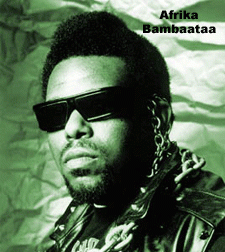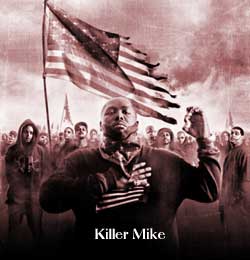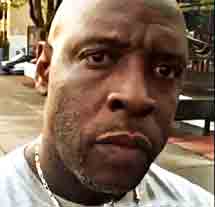
Afrika Bambaataa & Kool Herc
Today April 19th, we celebrate the birthday of one of Hip Hop’s founding fathers, Afrika Bambaataa. On Monday (April 16th) we celebrated the birthday of the Father of Hip Hop Kool Herc.. Sadly not many radio stations and other media outlets that have greatly benefited from Hip Hop music and culture which Herc and Bam tirelessly helped bring to the forefront have stopped or will stop to take time to give either of them a shout out at the very least.
We’re more likely to hear a birthday shout out to Kim Kardashian then to our pioneers but in today’s microwave society where people are commodities and ultimately disposable, one should not be surprised. Celebrating and even acknowledging the histories and pioneering figures of marginalized and oppressed communities aren’t often done especially if it can lead to folks rising up and questioning the direction and narratives being put forth by those in the mainstream who are in power.
This is not limited to Hip Hop. In 2012 all one has to do is look at the current wave of attacks on ethnic studies programs both in college and in high schools all over the country. We see the banning of ethnic studies and accompanying books in states like Arizona. We see attempts to rewrite and white wash history books in states like Texas, where iconic figures from Cesar Chavez to the Black Panthers are stricken from the pages. It’s our charge in Hip Hop to counter that by at the very least holding up the accomplishments and stories of those who came before us so that we can learn and build upon the legacies they laid down..
There’s so much one can say about Herc and Bam, hence when writing about him, its hard to know where to begin. I guess when writing about Herc we should note he was an athlete who was given the nickname Hercules (Herc for short) because of his height and muscular build. He was also down with a graffiti crew called the Ex Vandals. Most importantly Herc was into music and was always seeking ways to play it.
According to Herc he had a nice little rep for himself and thus had garnered a lot of respect..In August of 1973, he and his sister Cindy Campbell decided to throw a back to school party as away to raise a couple of dollars for school clothes.
http://www.youtube.com/watch?v=2_2CHTE975Q
 The story goes Herc brought down his fathers speakers to the rec center of their building 1520 Sedgwick Ave, they charged 50 cent for fellas to come in and the rest is history.. The music Herc played that night was funk music, that at that time was popular but slowly getting less and less airplay on the radio. Songs like Sex Machine and Give it Up and Turn It Lose by James Brown or Jimmy Castor‘s It’s Just Begun were among the jams Herc highlighted. The success of that party led to Herc doing others jams and it wasn’t too long before folks in the Bronx were seeking out Kool Herc parties.
The story goes Herc brought down his fathers speakers to the rec center of their building 1520 Sedgwick Ave, they charged 50 cent for fellas to come in and the rest is history.. The music Herc played that night was funk music, that at that time was popular but slowly getting less and less airplay on the radio. Songs like Sex Machine and Give it Up and Turn It Lose by James Brown or Jimmy Castor‘s It’s Just Begun were among the jams Herc highlighted. The success of that party led to Herc doing others jams and it wasn’t too long before folks in the Bronx were seeking out Kool Herc parties.
It was during this time that Herc developed a system of playing records that he dubbed the Merry Go Round. He basically would take the hottest part of a song, usually the percussion break down and extend indefinitely by going from one record to the next by passing everything but the juicy part of the record.
During those early jams, Herc would keep the crowd excited by shouting them out on the mic. He once explained to me that he wanted to make folks feel good and important and one way of doing that was calling out their name on the mic. He also noted that it was a way to keep the peace. So in the beginning one might’ve heard Kool Herc shout out ‘his mellow-ski.. Mark Mark or his boy Kev-ski. Slang terms in the early 70s were phrases like ‘My mellow’ or adding the word ‘ski’ at the end of someone’s name.
At the time it was big deal to get hear your name called out at a party by Kool Herc who was the center of attention and had a huge sound system he dubbed the Herculords. He later turned over the announcing duties to his friend Coke La Rock who became one of Hip Hop’s first emcees. Other members Timmy Tim and Clark Kent got down with the crew and collectively they were known as the Herculoids.
http://www.youtube.com/watch?v=AJkojOSppUE
 When it comes to talking about Afrika Bambaataa, it should be noted that he was known in the Bronx long before he touched a turntable. Bam started out as a gang leader.. He was a warlord for one of NYC’s largest gangs in the 1970s known as the Black Spades…
When it comes to talking about Afrika Bambaataa, it should be noted that he was known in the Bronx long before he touched a turntable. Bam started out as a gang leader.. He was a warlord for one of NYC’s largest gangs in the 1970s known as the Black Spades…
According to Bam, in spite of his gang affiliations he was always into music and well aware of culture and the Black liberation struggles. Even as a gang leader, some of the tactics he employed for overpowering his rivals were gleaned from military strategies he read about used by African leaders in particular the Zulu Tribe of South Afrika..
Bam really turned his attention to music and Hip Hop’s then emerging culture after one of his best friends Soulski was got shot and killed by police in the Pelham Bay section of the Bronx… Bam talks about how at that time NYPD had a division that was targeting NY’s large gang problem and the Spades were ready to go up against them as a result of Soulski being killed. He noted that the resulting death underscored the crackdown that was coming on the gangs who were starting to die down..
Bam soon formed a group called the Organization which later evolved into the Mighty Zulu Nation.. Bam explained that he wanted use Zulu as a way to turn lives around and refocus folks energy from banging to music. Early on Zulu was still seen as entity to be feared and not toyed with. Outlaw ways didn’t die down overnight. Bam explained it took a lot of meetings and conversations to get folks to walk a different path..Eventually many did as Zulu Nation blossomed into an organization with thriving chapters a;ll over the world.
Along with forming Zulu now known as the Universal Zulu Nation, Bam got into music and deejaying, and soon developed a reputation for playing unique and hard to find jams (break beats). He eventually became known as the Master of Records..and till this day prides himself on rocking what he describes as ‘break beats’ of the future..
We cover a lot of this as well as what was going on in the early days of Hip Hop in this interview.. Reflect and Enjoy.. Happy Birthday to my good friend Afrika Bambaataa














 I always find this concept of Texas secession interesting. I especially find it interesting when I see and hear the way it’s being framed. Words like ‘Freedom’ ‘Independence’ and ‘Oppression’ are used suggesting that it’s a noble endeavor and not something sinister. Some find the conversation compelling when it focuses on our main two parties Republicans and Democrats being a thorn in our collective sides that needs to be done away with. There’s lots of tough talk from secessionist about dissatisfaction with the Federal government which is very relatable when one looks at high unemployment rates, Wall Street Bankers getting bailed out, mismanaged wars and no Universal healthcare. All of this makes a secession argument intriguing.
I always find this concept of Texas secession interesting. I especially find it interesting when I see and hear the way it’s being framed. Words like ‘Freedom’ ‘Independence’ and ‘Oppression’ are used suggesting that it’s a noble endeavor and not something sinister. Some find the conversation compelling when it focuses on our main two parties Republicans and Democrats being a thorn in our collective sides that needs to be done away with. There’s lots of tough talk from secessionist about dissatisfaction with the Federal government which is very relatable when one looks at high unemployment rates, Wall Street Bankers getting bailed out, mismanaged wars and no Universal healthcare. All of this makes a secession argument intriguing. Over the past few weeks The Cypress Times has carried several opinion pieces in our Op/Ed Section from supporters of the Texas Nationalist Movement. The Texas Nationalist Movement supports Texas secession, and the establishment of a free and independent Texas.
Over the past few weeks The Cypress Times has carried several opinion pieces in our Op/Ed Section from supporters of the Texas Nationalist Movement. The Texas Nationalist Movement supports Texas secession, and the establishment of a free and independent Texas. 
 We concluded into our conversation by talking about the challenge both Blacks and Browns have in the US. They include buying into White Supremacy, Sharing Power and avoiding Divide and Conquer tactics. Salas said it was important that we support those who share the same goals and principles and not just a Brown or Black face. he talked about the miscalculation it was for some Black organizations to support Clarence Thomas and for some Mexican organizations to support Alberto Gonzalez. Salas noted that we should all strive to have a global perspective, be fully engaged and aware of policies we have toward Latin America and to connect the dots where ever possible.
We concluded into our conversation by talking about the challenge both Blacks and Browns have in the US. They include buying into White Supremacy, Sharing Power and avoiding Divide and Conquer tactics. Salas said it was important that we support those who share the same goals and principles and not just a Brown or Black face. he talked about the miscalculation it was for some Black organizations to support Clarence Thomas and for some Mexican organizations to support Alberto Gonzalez. Salas noted that we should all strive to have a global perspective, be fully engaged and aware of policies we have toward Latin America and to connect the dots where ever possible.
